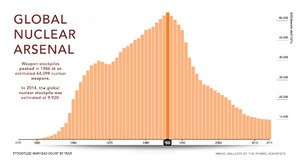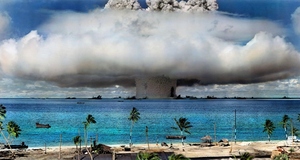From Cornell International Affairs Review VOL. 4 NO. 2The New Geopolitics: Why Nuclear Weapons No Longer Serve U.S. InterestsThere is no real debate or disagreement about it. It seemed very clear to all of them that Turkey would have to acquire its own nuclear capability. I think the Saudis seriously consider that option; the Egyptians would be another country that would consider that option. We could then see, rather than Iran just going nuclear, three or four or more countries moving towards nuclear weapon status. Add the Israelis, add the Iranians, and we're then talking about the world's most volatile region with five or six nuclear powers. Iran and nuclear proliferation are enormously dangerous. I won't even go into detail about North Korea — it is probably closest to what some analysts call a crazy state. I don't think that Iran is a crazy state. I don't even think Pakistan is a crazy state, but North Korea must fit that definition better than anybody else. Now I think that they have used their already existing nuclear arsenal for blackmail purposes — to get money, support, aid, attention of the international community, get people back to the negotiating table — anything to keep themselves on the front page. But they are going through a period of transition, and some of the things that they have done recently — sinking the South Korean frigate, shelling an island — tells me that if there's a place where a miscalculation could lead to a holocaust, it's North Korea. That's the dark side of this new G-20 world— the proliferation side of the G-20 world, and I think as these cases all in one way or another demonstrate, its hard to come up with a silver bullet solution to this problem; there's no kind of overarching simple solution. You can try to buy some of these countries off. We've tried that with North Korea — we've offered them food aid, other sorts of support, but they've continued to pursue their nuclear program. We could look at military force. There are those who advocate the Israeli or American bombing of Iran. But as people who have looked at that problem carefully will tell you, it doesn't solve the problem. It may defer the problem for a few years, but we don't know where the Iranian infrastructure is, and we don't know where all of those sites are. What about the unintended consequences? What could the Iranians do to us in Iraq or in Afghanistan? What could they do to the shipping lanes through the straights of Hormuz? Military solutions are not as attractive as some people think, once you look at them more carefully. There's nation building. We could go into Pakistan and spend billions of dollars and try to give them good schools; we could try to clean up their creaky bureaucracy and infrastructure, but that's a long-term enterprise. By the way, I don't think that Americans are good at nation building anyways — we're not patient enough. We're not like the British in the 18th and 19th centuries that spent their careers in India. We rotate people back and forth every six months. We're not good nation builders; I don't think nation building is a solution. What is necessary in my view, first and foremost, is building a strong international consensus around the 1968 Nuclear NonProliferation treaty, which recognizes the relationship between what analysts call vertical proliferation — building more nuclear weapons by countries who already have them, piling them up — and horizontal proliferation — new countries acquiring nuclear weapons for the first time. Our goal in the long run should be to de-legitimize nuclear weapons in largely the same way that we have delegitimized chemical weapons and biological weapons. I don't know anybody today who deploys biological weapons. There have been efforts in the past, and there has been some biological terrorism, but basically we have ruled biological and chemical weapons out of acceptable international behavior. We should have the capacity to turn those countries that want to have nuclear weapons, and get them into international pariah states. They should be isolated. The way to do this in my view is to elaborate and then implement, as we've done at Global Zero, but other groups are doing the same work as well, a twenty-year-or-so program in which the existing nuclear powers — the major powers — would make a serious effort to reduce and explore the complete elimination of nuclear weapons over a period of 20-25 years. Now you say, "that's a bold initiative, that's a bold dream, but is it really realistic?" Well, what's interesting is that we're making some headway already, and we take that headway for granted. For one thing, we couldn't, and I'm saying this as a Republican, we couldn't make a plausible case for Global Zero if it wasn't for Barack Obama, because he put nuclear weapons back on the front page. And he talked, and has talked repeatedly about the elimination of nuclear weapons worldwide. He did it most impressively in his Prague speech early on in his presidency. He got Dmitri Medvedev, the Russian president to sign up to the same goal. This was the first time a Russian and American leader had ever jointly called for the elimination of nuclear weapons. Then, in the first U.N. security council meeting ever chaired by a U.S. President, he got the French, the British, the Chinese, and the other members of the security council, to sign up for the long term goal of nuclear elimination. More recently, in his nuclear posture review last year, he deemphasized the role of nuclear weapons and said, "The United States would never use a nuclear weapon against another member of the Nuclear Non-proliferation treaty that was abiding by that treaty." That was an important initiative. I'm not sure whether the Iranians (this is a controversial thing to say in Washington) have yet decided to acquire nuclear weapons. Obama convened a nuclear security summit, where over fifty countries and heads of government came to Washington and agreed on a three-year work program to address the "Loose Nukes" problem, and to begin to gain control of all of this nuclear material and nuclear know how, so that it didn't fall into the wrong hands. That's good progress, but the real test is for the existing major nuclear powers to get this reduction regime underway. The first step, obviously, is to get this new START treaty ratified — the one that the U.S. and Russia have negotiated, which brings down the number of deployed nuclear weapons down to 1500 and 50, and the number of launchers, missiles and bombers down to 800. If that treaty gets ratified, we can go back to the Russians and negotiate a follow on treaty, which I believe could bring weaponry down to a thousand or so nuclear weapons. I think that's a magic number. If you can get both sides' number of nuclear weapons down to roughly 1000, I think you have a fair chance of getting China to the table. The Chinese have never willing to compromise, or formally negotiate any constraints on their nuclear forces. Why would they do it under this circumstance? They would see, they would understand, that without their agreement to come to the table, there's no incentive for the Russians to go much further. Because what the Russians will tell you privately is that ‘we're not going to go that much lower, because we have to worry about the Chinese.' But if you can tell the Russians that the Chinese will be there, in another negotiation where you come down to 1000, then you've got a win-win for China and Russia. What happens when you get China to the table? Then you have the leverage to get the Indians into the negotiation. What we need to aim at is not just another round of the old fashioned U.S.-Russian negotiation, but a great power negotiation — a multilateral negotiation where everyone including the Pakistanis and the Israelis would agree to schedule proportional reductions. At some point you enter what people call the endgame, where you get to zero. I am not going to address that because that's a long way off. I just want to focus on the next ten years. Our goal for the next ten years, though, should be to get this new U.S.-Russia agreement ratified, get another U.S.-Russia agreement that brings warheads down to a lower level of around 1000, and gets this multilateral negotiation with all of the major nuclear powers underway. I will conclude by saying that if we can't get this rather modest, existing treaty, that's before the Senate, ratified now, then all bets are off on the ability to pursue the this ambitious two-decade goal of nuclear elimination. For one thing the Russians aren't just going to say, "well, too bad you couldn't follow through on the deal let's start again." No. The Russians have already indicated, "We can't do business with you guys. We're going to pursue our own options; some of them will be military. If you can't negotiate a treaty and then get it ratified, then there's no real future in this process." What is that going to do to the credibility of our non-proliferation policy? How do we look Mr. Ahmadinejad in Iran in the eye, and say "you can't have nuclear weapons," when he's going to say "you can't reduce nuclear weapons! You've got thousands of nuclear weapons. You and the Russians have 95 percent of the world's stockpile, and you can't get a treaty ratified to reduce a few hundred of them?" We will look totally ridiculous in that situation. We give the Iranians, the North Koreans and anybody else who wants to acquire nuclear weapons the talking points for doing so, because the talking points are very simple. The Americans talk a good game but they can't get it done. Finally, at a time when we are paralyzed in Washington over coming together on a plan to reduce our fiscal deficit, and our national debt, to not be able to carry out a critical foreign policy initiative, the United States might begin to resemble what Richard Nixon, at the height of the Vietnam War, might call a "pitiful, helpless giant." That's the challenge, that's what this treaty is all about. It's not just about another old fashioned, U.S.-Russia Cold War agreement. It's about launching a grand process, which will deal with the dark side of globalization — the spread of nuclear weapons — and strengthen the bright side of globalization — a globalized economy with greater productivity, innovation and prosperity. Photos courtesy of: Suggested Reading from Inquiries Journal
Inquiries Journal provides undergraduate and graduate students around the world a platform for the wide dissemination of academic work over a range of core disciplines. Representing the work of students from hundreds of institutions around the globe, Inquiries Journal's large database of academic articles is completely free. Learn more | Blog | Submit Latest in International Affairs |




















